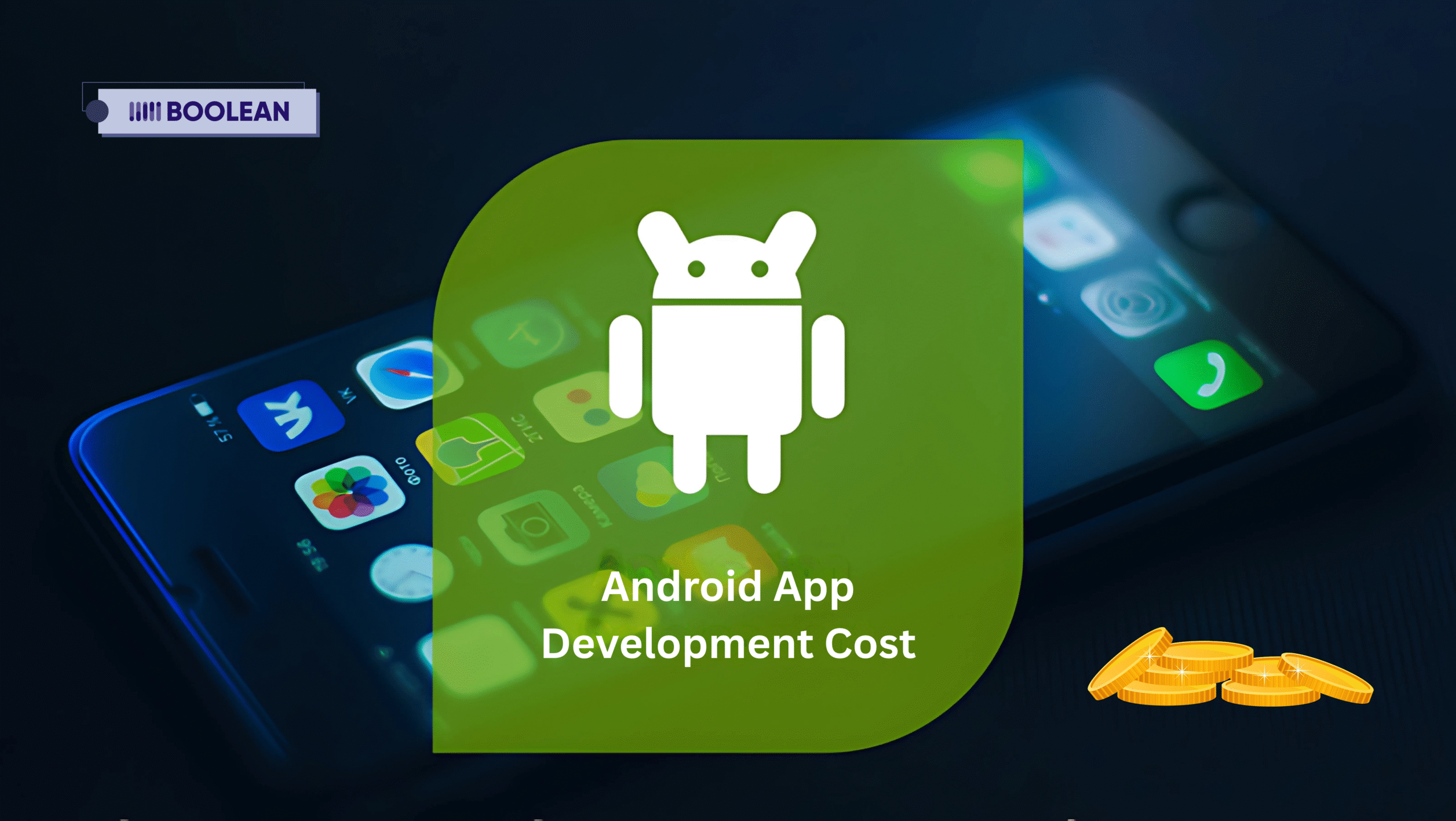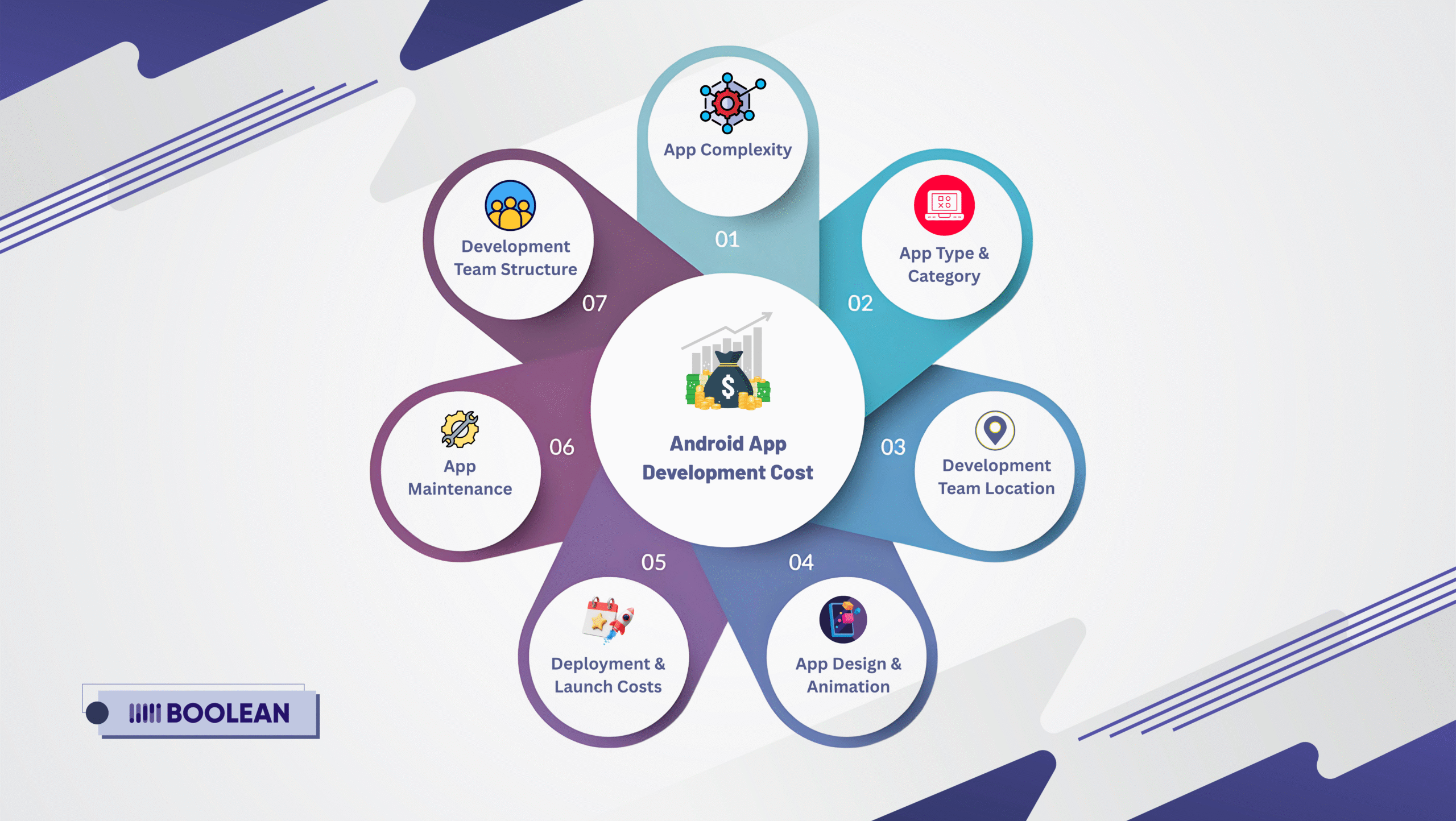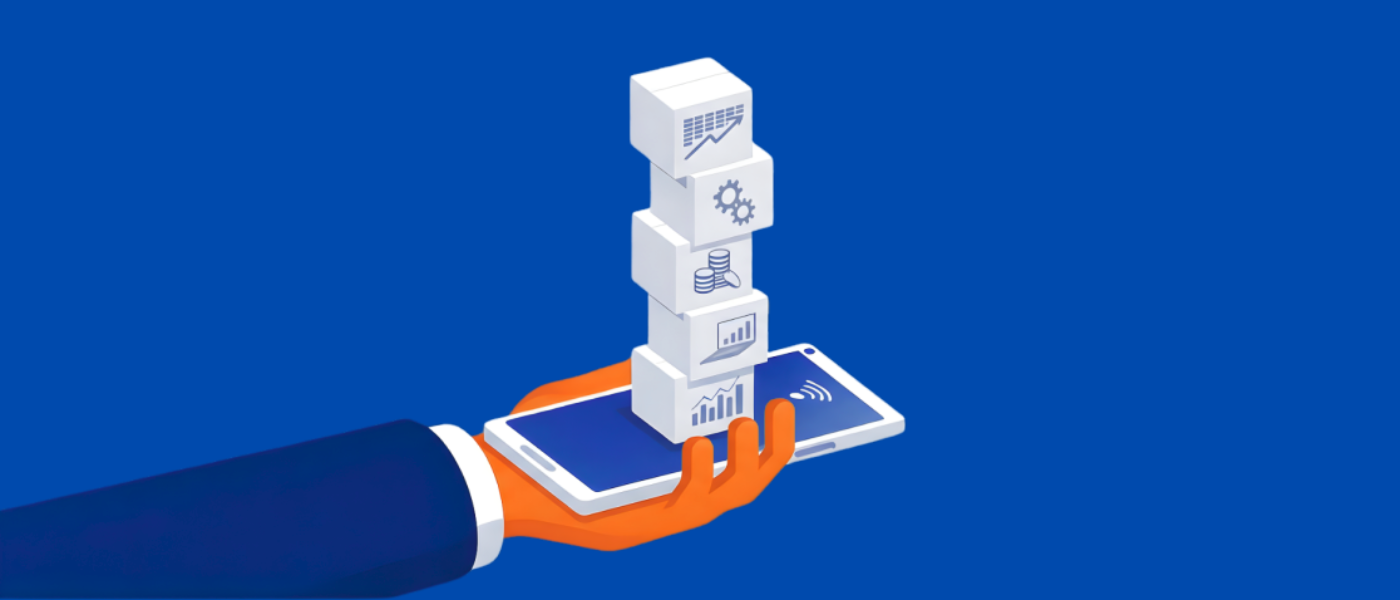Introduction
There is no shred of doubt that Android is one of the most lucrative platforms for mobile app development.
Android hosts over 5 million apps in the Google Play Store with an installed base of 2.5 billion active users.
Startup companies interested in the development of Android apps, as well as enterprises outsourcing people to work on Android app development, should have a firm understanding of the cost of the Android app development process to prepare a suitable budget.
The cost of developing the mobile application in the year of 2025?
Building a simple Android application can average anything from $5,000 to $30,000+, depending on the complexity of the project, its features, and the team being hired.
Global Mobile App Market to be worth over US$ 967.74 Billion by 2033. Thus, developing a carefully planned app can turn out to be extremely lucrative.
But what drives these costs? Factors like:
- App complexity (simple vs. feature-rich)
- Developer rates (25–100/hour based on location & expertise)
- Design & backend requirements
- Whether you hire Android programmers in-house or outsource
In this guide, we’ll break down the Android app development cost in 2025, covering everything from the minimum cost to create an app to advanced mobile application development pricing.

By the end, you’ll know:
- How to make an Android app within your budget
- Whether to hire a cheap Android app developer or invest in a professional team
- The average cost of app development based on real-world benchmarks
If you’re ready to turn your app idea into reality, partnering with a trusted Android app development company can save time, money, and headaches. Let’s dive in!
Android App Development Cost Based on App Complexity
Planning to make an Android application, the complexity of an app is one of the biggest factors for determining your budget.
If you are just looking for something simple or a heavy-featured one, then the price of Android app development varies because of its function, design, and the time taken to develop.
So this is the full breakdown of how much it costs to make an Android app, categorized according to complexity:
| App Type | Estimated Cost ($) | Development Time | Key Features |
| Simple App Development | 5,000–15,000 | 2-3 months | Basic UI, limited features (e.g., calculators, note-taking apps) |
| Mid-Level App Development | 15,000–25,000 | 3-6 months | Custom UI, API integrations, moderate backend (e.g., e-commerce apps, social platforms) |
| Complex App Development | 25,000–30,000+ | 6-12 months | Advanced features (AI/ML, real-time data, multi-platform sync) |
What Influences the Android App Making Cost?
- Simple Apps: Ideal if you’re exploring how to make an Android app with minimal features. Uses basic templates and pre-built solutions.
- Mid-Level Apps: Requires more customization, increasing the average cost of app development. Examples include food delivery or fitness tracking apps.
- Complex Apps: High as of Android app development price because of advanced tech like AI, blockchain, or IoT integration (for instance, Uber-like apps, enterprise solutions).
Pro tip: Start an MVP to save costs when you are very tight on your budget, and move toward testing the idea further before scaling it. Start by using Android app builders to minimize initial costs.
Key Factors Affecting Android App Development Cost

When you start your journey to build an Android app, you won’t get an instant price quote from development companies—and for good reason.
A reliable Android app development company needs to analyze your project’s unique requirements before estimating costs. Why?
Because multiple factors influence the final Android app development price, overlooking even one can lead to budget overruns.
Here’s the first (and most critical) factor that shapes your app’s cost:
- Level of App Complexity
The complexity of your app is the #1 driver of development costs. A basic to-do app won’t cost the same as a feature-rich social media or e-commerce app.
What Makes an App Complex?
- Deployment Architecture
- Using Backend-as-a-Service (BaaS) like Firebase reduces costs.
- A custom backend (Node.js, Django) increases Android app development charges.
- Third-Party Integrations
- Logins (Google, Facebook), payment gateways (Stripe, PayPal), or APIs (Google Maps) add to the app development cost breakdown.
- Admin Panel Development
- Needed for managing users, content, and analytics—adds 15–20% to the average cost of app development.
- In-App Purchases & Monetization
- Implementing subscriptions, ads, or one-time purchases requires extra development effort.
Android App Development Cost Based on Complexity
| App Type | Key Features | Timeframe | Cost Range ($) |
| Basic App | MVP features, simple UI, single platform | 2-3 months | 5,000–15,000 |
| Mid-Level App | Custom UI, APIs, and moderate features | 6-8 months | 15,000–25,000 |
| Complex App | Advanced tech (AI/ML), multi-platform | 6-12 months | 5,000–30,000+ |
Real-World Examples
- Basic: A calculator or note-taking app (5K–15K).
- Mid-Level: A food delivery app with real-time tracking (15K–25K).
- Complex: An on-demand service app like Uber ($25K+).
Pro Tip: Start with an MVP (Minimum Viable Product) if you’re testing the market. This cuts the initial Android app making cost while validating your idea.
- App Type & Category: How It Impacts Android App Development Cost
The app type has a direct reflection on the Android application development cost.
If you are wishing to develop a mobile social networking platform, an e-commerce marketplace, or a mobile game, you can see that each one has different technical requirements, all of which will influence the prices involved.
In 2025, some of the most lucrative and in-demand app categories are listed here:
- Gaming Apps (High-end 3D graphics, AR/VR integration)
- E-commerce Apps (Secure payment gateways, inventory management)
- Social Networking Apps (Real-time chat, video streaming)
- Health & Fitness Apps (Wearable integrations, AI-based coaching)
- FinTech Apps (Bank-grade security, blockchain compatibility)
Estimated Cost Breakdown by App Category (2025)
| App Type | Key Features | Estimated Cost ($) |
| Basic Web App | Responsive UI, simple backend | 60,000–200,000 |
| Startup App (MVP) | Core features, scalable architecture | 40,000–400,000 |
| Taxi App (Uber-like) | GPS tracking, payment integration | 50,000–400,000 |
| Mobile Game App | 3D graphics, multiplayer support | 60,000–250,000 |
| Retail/eCommerce App | Product catalog, checkout system | 50,000–150,000 |
| AR/VR App | Augmented reality features | 100,000–250,000 |
| Social Media App | Live streaming, user profiles | 50,000–300,000 |
| Video Streaming App | Content delivery, subscriptions | 80,000–300,000 |
| Restaurant/Food Delivery | Order tracking, menu management | 40,000–150,000 |
| Dating App | Matchmaking algorithms, chat | 40,000–150,000 |
| Healthcare App | HIPAA compliance, telemedicine | 55,000–300,000 |
Why Does App Category Affect Cost?
- Complexity of Features: A gaming app with 3D animation costs more than a basic utility app.
- Security Needs: FinTech apps require bank-level encryption, increasing Android app development charges.
- Third-Party Integrations: Food delivery apps need real-time GPS & payment APIs, adding to expenses.
Can You Save Costs?
If you are on a budget, you can check out how to make an Android app for free using low-code tools such as Appy Pie or FlutterFlow.
Or, if you want a great app developed, you can hire an Android programmer from cheap developing regions like Eastern Europe or Asia, to save almost 30-50% on your cost.
- Development Team Location: How Region Impacts Android App Development Cost
Where you hire Android developers plays a huge role in your final app development cost.
Here’s a breakdown of how much app development costs based on location in 2025:
Android App Development Costs by Region
| Region | Hourly Rate (USD) | Cost for a Mid-Sized App (15K–25K Project) |
| United States (USA) | 100–120 | 50,000–120,000 |
| United Kingdom (UK) | 130–150 | 65,000–150,000 |
| Australia | 110–140 | 55,000–140,000 |
| Western Europe | 80–100 | 40,000–100,000 |
| Eastern Europe | 20–60 | 10,000–60,000 (Best value for quality) |
| India | 15–40 | 7,500–40,000 (Most budget-friendly) |
Why Does Location Affect Cost?
- Labor & Living Costs: Developers in the US/UK charge more due to higher salaries.
- Economic Differences: Regions like Eastern Europe & India offer skilled developers at 50–70% lower rates.
- Time Zone & Communication: Nearshore teams (e.g., Eastern Europe) balance cost and collaboration ease.
How to Choose the Right Region for Your Budget?
- Startups & Small Budgets → India or Eastern Europe (15–60/hr)
- Mid-Range Budgets → Latin America or Eastern Europe (40–80/hr)
- Enterprise Projects → US/UK/Australia ($100+/hr) for local support
Pro Tip: If you’re wondering “how much does an Android app cost?”, outsourcing to Eastern Europe or India can reduce your app creation price by 40–60% without sacrificing quality.
Real-World Cost Comparison
| App Type | USA Cost | Eastern Europe Cost | India Cost |
| Basic App | $15,000+ | 7,000–12,000 | 5,000–10,000 |
| Mid-Level App | $50,000+ | 20,000–35,000 | 15,000–25,000 |
| Complex App | $100,000+ | 40,000–80,000 | 30,000–60,000 |
- App Design & Animation: How It Affects Android Development Cost
A visually stunning and intuitive Android app design doesn’t just attract users—it also impacts your app development price.
From basic wireframes to advanced 3D animations, design complexity plays a major role in determining costs.
Here’s a detailed breakdown of Android app development cost based on design & animation:
Android App Design & Animation Cost (2025)
| Design/Animation Type | Cost Range ($) | Key Features |
| Basic UI/UX Design | 5,000–15,000 | Simple layouts, minimal customization, standard components |
| Moderate UI/UX Design | 15,000–30,000 | Custom icons, branded themes, interactive prototypes |
| Complex UI/UX Design | 30,000–60,000 | High-end visuals, micro-interactions, motion design |
| Simple Animations | 5,000–10,000 | Basic transitions (fade, slide), loading animations |
| Advanced Animations | 10,000–30,000 | 2D/3D effects, complex transitions, game-like UI |
| Material Design (Google’s Standard) | 7,000–20,000 | Clean, responsive, and intuitive UI |
Why Does Design & Animation Impact Cost?
- Custom vs. Template-Based – Using an Android app builder with pre-made templates reduces costs, while custom designs increase them.
- Animation Complexity – A basic app may need simple transitions, while a gaming or AR app requires high-end animations.
- Designer Expertise – Hiring a top-tier UI/UX designer costs more but improves user retention.
How to Optimize Design Costs?
- Start with Wireframes (3K–10K) to validate your app flow before full design.
- Use Material Design (7K–20K) for a polished, cost-effective look.
- For simple apps, consider no-code Android app builders (e.g., FlutterFlow) to cut costs.
Pro Tip: If you hire Android developers from regions like Eastern Europe or India, you can get high-quality UI/UX design at 30–50% lower rates compared to the US/UK.
- Play Store Deployment & Launch Costs
Launching your app on the Google Play Store is the final step in Android app development, but it comes with its own set of costs.
While Google only charges a one-time $25 developer fee, several other expenses impact your total app development price.
Here’s a breakdown of Play Store deployment costs in 2025:
Android App Deployment Cost Breakdown
| Deployment Task | Estimated Cost ($) | Description |
| Google Play Developer Fee | $25 (one-time) | Mandatory for publishing |
| App Testing & Bug Fixes | 1,000–5,000 | Ensures stability & performance |
| App Store Optimization (ASO) | 500–2,500 | Improves visibility & downloads |
| App Marketing & Ads | 1,000–10,000+ | Google Ads, social media promotions |
| Ongoing Maintenance (Monthly) | 500–3,000 | Updates, compatibility fixes |
Why Do These Costs Matter?
- Testing is Non-Negotiable – Skipping QA leads to negative reviews & uninstalls.
- ASO Boosts Organic Installs – Proper keywords & visuals increase discoverability.
- Marketing Drives Downloads – Even a great app needs promotion to succeed.
How to Reduce Play Store Deployment Costs?
- Use Free Testing Tools (Firebase Test Lab, Beta Testing) to cut QA costs.
- Hire a cheap Android app developer for ASO (instead of expensive agencies).
- Promote organically via social media before spending on ads.
Pro Tip: If you’re working on a minimum budget, you can build an Android app for free using no-code tools (like MIT App Inventor) and deploy it for just $25.
- Android App Maintenance: The Hidden Cost of Success
Many businesses focus only on the initial Android app development cost, but ongoing maintenance is what keeps your app competitive, secure, and functional.
Depending on your app’s complexity, maintenance can cost 15-25% of the original development price annually.
Here’s a detailed breakdown of post-launch Android app maintenance costs in 2025:
Ongoing Android App Maintenance Costs
| Maintenance Task | Estimated Cost ($) | Why It’s Needed |
| Quality Assurance (QA) Testing | 4,000–12,000 per year | Ensures compatibility with new OS updates |
| Monthly App Updates | 500–3,000 per month | Minor UI/UX tweaks, performance fixes |
| Bug Fixes & Optimization | 1,000–5,000 per month | Resolves crashes, improves speed |
| New Feature Upgrades | 2,000–10,000 per feature | Keeps users engaged (e.g., adding payment options) |
| Security Patches | 500–3,000 per update | Protects against breaches (critical for fintech, healthcare) |
| Customer Support | 1,000–3,000 per month | Handles user queries & feedback |
| Backend Server Costs | 100–2,000 per month | Hosting, database management, and API maintenance |
Why Maintenance Costs Add Up
- OS Updates: New Android versions require app compatibility fixes.
- User Expectations: Apps need frequent updates to retain users.
- Security Risks: Unmaintained apps are vulnerable to hacking.
Pro Tip: If you worked with a cheap Android app developer, maintenance costs might be higher due to poor initial code quality. Investing in skilled developers reduces long-term expenses.
How to Reduce Maintenance Costs?
- Use Cloud-Based Backends (Firebase, AWS) to minimize server costs.
- Automate Testing (CI/CD pipelines) to cut QA expenses.
- Outsource Maintenance to regions with lower rates (e.g., Eastern Europe).
Key Takeaways
- The average cost of app development doesn’t end at launch—maintenance is 20%+ yearly.
- Android app making cost includes both creating and sustaining the app.
- A detailed app development cost breakdown should always account for post-launch needs.
Planning your app’s lifecycle budget? [Get a Maintenance Estimate] from our experts.
- Development Team Structure: How Your Team Choice Impacts Cost
You hire Android app development staff according to the best mode of hiring that falls into heavy costs-hiring freelancers, an in-house team, or even hiring an agency.
Each option involves different costs, levels of experience, and long-term commitments.
Here’s how your team selection affects the total Android app development cost:
Android App Development Cost Based on Team Structure
| Team Type | Pros | Cons | Estimated Cost Range ($) |
| Freelance Developers | ✔ Lowest cost (15–50/hr) ✔ Flexible hiring | ✖ Limited accountability ✖ Coordination challenges | 5,000–50,000 |
| In-House Team | ✔ Full control ✔ Long-term asset | ✖ High salaries ($80K+/year per dev) ✖ Recruitment overhead | 100,000+ per year |
| Outsourced Agency | ✔ End-to-end service ✔ Scalable resources | ✖ Higher upfront cost | 30,000–300,000+ |
| Hybrid (Freelance + Agency) | ✔ Cost-effective ✔ Specialized talent | ✖ Management complexity | 20,000–150,000 |
Cost Breakdown by Team Roles (Outsourced Agency Example)
| Role | Simple App ($) | Mid-Level App ($) | Complex App ($) |
| Android Developers | 30K–40K | 50K–60K | 100K+ |
| UI/UX Designer | 4K–5K | 5K–7K | 10K–15K |
| QA Testers | 8K–10K | 15K–20K | 20K+ |
| Project Manager | 5K–7K | 10K–15K | 10K+ |
| Total | 20K–50K | 50K–100K | 100K+ |
Hidden Android App Development Costs to Watch Out
When budgeting for Android app development, most businesses focus on upfront costs, but hidden expenses can derail your project.
Here are 5 often-overlooked factors that inflate your total Android app development cost:
| Hidden Cost Factor | Estimated Cost ($) | Why It Matters |
| Device Fragmentation Testing | 3,000–10,000 | Ensures app works across 10,000+ Android devices (screen sizes, OS versions). |
| App Security Measures | 5,000–15,000 | Prevents data breaches; includes encryption, GDPR/CCPA compliance, and pentesting. |
| Frequent OS Updates | 2,000–7,000/update | Mandatory fixes for new Android versions to avoid crashes or poor performance. |
| Legal & Compliance Fees | 3,000–10,000 | Covers licenses, privacy policies, and patent checks to avoid lawsuits/fines. |
| Post-Launch Maintenance | 5,000–20,000/year | Ongoing bug fixes, server costs, and feature updates to retain users. |
Android vs. iOS App Development Costs in 2025: Comprehensive Comparison
- Development Cost Breakdown
| Aspect | Android | iOS | Key Insight |
| Programming | Kotlin (modern), Java (legacy) | Swift (modern), Objective-C (legacy) | iOS developers charge 10-15% higher rates due to specialized Swift skills. |
| Hourly Rates | 25−100 (Global average) | 30−120 (Western markets premium) | Offshore Android teams (India/Eastern Europe) offer 40% cost savings. |
| Project Timeline | 20-30% longer (due to fragmentation testing) | 15-20% faster (standardized devices) | iOS projects complete quicker but have stricter design reviews. |
| Hidden Costs | Device-specific optimizations (3k−10k) | App Store compliance audits (2k−8k) | Both platforms have unique “gotchas” that inflate budgets. |
Pro Tip: Use Flutter or React Native for cross-platform apps to save 30-40% on development costs while maintaining 90% native performance.
- Design & UX Considerations
| Factor | Android | iOS | Impact |
| Guidelines | Material Design (flexible) | Human Interface Guidelines (strict) | iOS apps require more design iterations to meet Apple’s standards (+15% cost). |
| Screen Variants | 10,000+ device configurations | ~20 current iPhone models | Android needs 3-5x more design adaptations for different screens. |
| Animation Costs | 5k−15k (basic) | 8k−20k (complex) | iOS prioritizes fluid animations, requiring higher design investment. |
Case Study: A social media app’s UI costs:
- Android: $18,000 (50+ device optimizations)
- iOS: $15,000 (but took 3 extra weeks for App Store approval)
- Testing & Quality Assurance
| Testing Type | Android | iOS | Cost Difference |
| Device Coverage | 50+ devices for 80% coverage | 5-10 devices for 95% coverage | Android QA costs 2-3x more (10k vs. 4k for basic apps). |
| OS Fragmentation | 15+ active Android versions | 2-3 latest iOS versions | Supporting older Androids adds 7k−12k/year in maintenance. |
| Automation | 40% test coverage (complex setups) | 60% coverage (standardized tools) | iOS achieves better testing efficiency with Xcode tools. |
Data Point: Device testing time per app version:
- Android: 120-200 hours
- iOS: 40-80 hours
- App Store Economics
| Metric | Google Play Store | Apple App Store | Business Implication |
| Submission Fee | $25 one-time | $99/year | Negligible difference for established businesses. |
| Approval Time | 1-3 days | 3-7 days | iOS delays can push launch timelines (+2k−5k in holding costs). |
| Revenue Share | 15% (first $1M), then 30% | 15-30% (standard) | Android offers better margins for small developers. |
| User Spend | $0.50 average per download | $1.20 average per download | iOS users generate 2.4x more revenue, justifying higher development costs. |
Monetization Tip: Hybrid apps using Stripe or PayPal avoid 15-30% platform fees on premium content.
- Regional Cost Variations
Where to Hire Developers for Best Value (2025 Rates)
| Region | Android Dev Rate | iOS Dev Rate | Advantage |
| India | 15−35/hour | 20−45/hour | Best for startups – 60% savings, but requires strong project management. |
| Eastern Europe | 30−60/hour | 40−80/hour | Ideal balance – High quality at 40% US cost. |
| USA/Western EU | 80−150/hour | 90−180/hour | Only for regulated apps (healthcare/finance needing local compliance). |
Strategic Advice: For complex apps:
- Core team in Eastern Europe ($50/hour)
- QA specialists in India ($25/hour)
- Project manager locally
How Boolean Inc. Can Help You Optimize Android App Development Costs
With over 3 billion active Android devices worldwide (72% of the mobile market), launching an Android app is one of the smartest business decisions you can make.
However, uncontrolled development costs can quickly turn this opportunity into a financial challenge.
At Boolean Inc., we specialize in high-quality, cost-efficient Android app development that delivers exceptional ROI. Our proven strategies help businesses of all sizes build premium apps without premium price tags.
Boolean Inc.’s Cost-Optimization Framework
- Strategic Development Planning
- MVP-First Approach: Launch with essential features for 40-60% lower initial investment
- Architecture Audits: Our engineers optimize your tech stack to prevent costly rework
- Cross-Platform Solutions: Where appropriate, we use Flutter/Kotlin Multi Platform to save 30-50% on dual-platform development
- Smart Team Configurations
| Option | Best For | Cost Advantage |
| Dedicated Offshore Team | Long-term projects | 50-60% vs US rates |
| Hybrid Local+Global | Complex integrations | 35-45% savings |
| Fixed-Price Projects | Well-defined scopes | Zero budget creep |
- Efficiency-Boosting Technologies
- AI-Assisted Coding: Our proprietary tools accelerate development by 20-30%
- Automated Testing Suite: Reduces QA costs by 40% vs manual testing
- Reusable Component Library: Pre-built modules for common features (saves 100+ hours)
- Transparent Cost Control
- Detailed Milestone Budgeting: Know exact costs before each phase begins
- Real-Time Dashboards: Monitor burn rates and deliverables 24/7
- Change Order Protection: Guaranteed pricing on scope adjustments
Why Boolean Inc. Stands Out
🔹 4+ Years of Android cost-optimization experience
🔹 300+ Apps delivered with 97% on-budget completion
🔹 Unique Guarantee: Beat any qualified estimate by 15% or we’ll match it
Our Clients Save an Average Of:
- 35% on initial development
- 50% on maintenance
- 60% on scaling costs
Take the First Step Toward Affordable Excellence
[Get Your Custom Cost Estimate] in 24 hours or explore our:
- Portfolio of Cost-Optimized Apps
- Client Success Stories
Boolean Inc. – Where Quality Meets Cost Efficiency in Android Development.
Conclusion
Building a successful Android app in 2025 requires smart budgeting as much as technical expertise.
As we look toward the future of mobile technology, Android continues to dominate the global market with an ever-expanding user base.
The insights shared in this guide highlight that while Android app development costs can vary significantly, they are ultimately an investment in your business’s digital future.
As we’ve explored:
- Costs vary widely (5,000−300,000+) based on complexity, features, and team structure.
- Hidden expenses (testing, security, maintenance) can add 20-30% to your initial budget.
- Strategic choices like MVP development, offshore teams, and cross-platform tools can save 40-60%.
At Boolean Inc., we turn these insights into real cost savings through:
- Architecture-first planning to prevent wasteful spending
- Global talent networks that deliver quality at competitive rates
- Proven frameworks that accelerate development without compromising quality
The bottom line? With careful planning and the right partner, you can:
- Launch faster by focusing on must-have features first.
- Spend smarter through strategic resource allocation.
- Scale efficiently with future-proof technical foundations.
Ready to build your Android app with maximum value?
[Get Your Free Cost Optimization Plan] from Boolean Inc. experts today.
Your dream app. Our cost-smart blueprint. Let’s build it right.
FAQs
- What is the average cost to build an Android app in 2025?
Basic apps start at 20,000−50,000, mid-range apps cost 40,000−80,000, and complex apps (like marketplaces or social platforms) range from 80,000−250,000+.
- How can I reduce Android app development costs?
You can reduce Android app development cost by the MVP approach, hire offshore developers (saving 30-50%), or use cross-platform tools like Flutter.
- How long does Android app development take?
Timeline depends on complexity:
- Simple app: 3-6 months
- Medium app: 6-9 months
- Complex app: 9-18 months
- What’s more expensive: Android or iOS app development?
iOS apps typically cost 15-25% more due to stricter design guidelines and higher developer rates. However, Android’s device fragmentation increases testing costs.
- What ongoing costs should I budget for after launch?
Post-launch typically requires:
- Monthly maintenance (500−5,000)
- Hosting/backend costs (100−2,000/month)
- Feature updates (2,000−15,000 per update)
- Marketing and ASO (variable costs)







